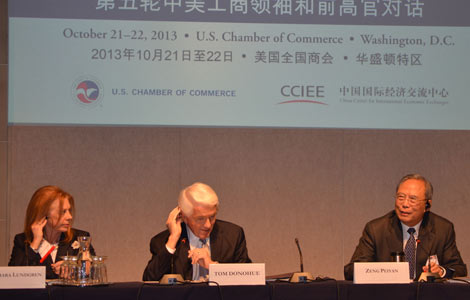Companies urged to step up contacts with unions abroad
Updated: 2013-10-23 00:14
By He Dan (China Daily)
|
||||||||
Chinese companies have been advised to attach more importance to communication with trade unions in host countries when they expand business overseas.
Some enterprises, in the course of expanding overseas, have realized the necessity of good communication with local trade unions.
"Apart from following an overseas market's laws, it is important to understand how local trade unions work, because they can be very different to China's trade unions," said Li Jirong, chairman of Shanghai SAIC Motor Corp's trade union. Li attended the 16th National Congress of the All-China Federation of Trade Unions, which ended on Tuesday.
His company now focuses on expanding operations in overseas markets. It has set up a manufacturing base in the United Kingdom and plans to open sales centers in Southeast Asia.
Zeng Guang'an, president of Guangxi LiuGong Machinery Co Ltd, agreed with Li's comments on having good communication with overseas trade unions.
The construction machine producer acquired Huta Stalowa Wola, a premier manufacturer of bulldozers in Stalowa Wola, a city in southeastern Poland, in January 2012.
Zeng attributes the success of his company's merger deal in Poland to its strategy of prioritizing negotiations with local trade unions.
"We are aware that trade unions in Europe are very strong, and our friends there all suggested we negotiate with local trade unions before making the next move," he told China Daily in an e-mail interview.
"Although it took us half a year to reach agreement with local trade unions about employees' performance management and corporate regulations, the rest of the merger process went smoothly."
The company also invited representatives from Polish trade unions to visit its plants in Tianjin and Jiangsu province, he said, as a move to help them better understand the company's development and management in order to realize the integration.
China has become the world's third-largest investor after the United States and Japan, according to a report released by three government departments in September.
"All companies fear trade unions, and they try to avoid trade unions in most circumstances, but this is not always possible," said Ibrahim Ghandour, chairman of the Organization of African Trade Unions Unity.
Engagement is a better alternative, he told China Daily on the sidelines of an international forum on economic globalization and trade unions in Beijing in September.
It is vital to bring trade unions into the heart of cooperation between Chinese companies and host countries' governments, he said, adding that a stronger relationship between Chinese companies and unions in host countries will help locals find work and investors to earn profits.
Diana Chia, president of the National Trades Union Congress in Singapore, who also attended the forum, said Chinese investors are active in construction, oil and the financial industry in Singapore.
She urged them to be more transparent and to allow trade unions to represent workers.
"When employees are happy, they can contribute more than 100 percent to their employers," she said.
On Tuesday, 1,900 trade unions' representatives voted to pass an amendment on the constitution of China's trade unions at the closing ceremony of the federation's 16th National Congress.
About 30 modifications have been made to the previous trade unions' constitution, with establishing a dedicated committee for female workers in grassroots unions written into the latest version.
Zheng Jinran and Du Juan contributed to this story.
hedan@chinadaily.com.cn
 Pumpkin fun ahead of Halloween
Pumpkin fun ahead of Halloween
 Weakening Raymond soaks Mexico, no serious damage
Weakening Raymond soaks Mexico, no serious damage Apple unveils new Macs, iPad ahead of holidays
Apple unveils new Macs, iPad ahead of holidays
 Smart cities to aid urbanization
Smart cities to aid urbanization
 In control & breaking the mold
In control & breaking the mold
 Higher retirement age may help solve pension problem
Higher retirement age may help solve pension problem
 Northeast remains shrouded in smog for third straight day
Northeast remains shrouded in smog for third straight day
 Beijing Opera troupe perform in Brazil
Beijing Opera troupe perform in Brazil
Most Viewed
Editor's Picks

|

|

|

|

|

|
Today's Top News
Top officials promote new power relations
Iowa, Hebei 'sister' visit wraps up
Yingli uses US baseball stars in campaign
NASA: Chinese scientists not banned
China's US Treasury holdings hit six-month low
Graduate looks at kung fu-hip hop connection
Apple unveils new Macs, iPad
San Francisco train service restarts after strike
US Weekly

|

|








